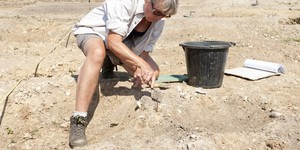Life Science Careers (25 results)
|
Select a resource
Filter by
Sort by
|
Career Profile
Anthropologists who are employed by colleges and universities usually spend much of their time in offices, classrooms, and libraries. Their working hours are flexible but often total more than 40 hours a week. Most anthropologists also do some field work. This work may take them to study sites as diverse as the Arctic to study the Inuit or Eskimos, to Africa to dig at an archaeological site or observe monkeys in their natural habitat, or into a modern city to record the behavior and attitudes…
Read more
Career Profile
A nice cool yogurt is the perfect snack. It comes in a variety of delicious flavors like peach, chocolate, and cherry and contains calcium, vitamins, and minerals that are good for you. Yogurt also contains live cultures that your body needs to maintain good health. How did all of those good things get into your yogurt? The answer is that a biochemical engineer helped to develop a recipe to make that yogurt a perfect snack for you. So many of the products that we use every day, from medicine…
Read more
Career Profile
Why is it that certain breeds of cattle produce more flesh or milk? Why is one horse faster than another? The answer is that these breeds were engineered to have these special characteristics. Animal breeders need to understand genetics in order to produce animals that are bigger, faster, or more beautiful. If you are interested in working with animals and are fascinated by the science of genetics, then you should investigate this career.
Read more
Career Profile
With a growing world population, making sure that there is enough food for everyone is critical. Plant scientists work to ensure that agricultural practices result in an abundance of nutritious food in a sustainable and environmentally friendly manner.
Read more
Career Profile
Everyday heroes in the animal healthcare world are veterinary technicians and technologists. Just as nurses assist doctors, veterinary technicians and technologists are on the front lines, assisting veterinarians. As part of their duties, they perform initial physical exams, take samples, run tests in the lab, monitor patients' heart and respiratory rates, give shots, and assist in surgery and dental work. Their work helps relieve animal suffering and prevent future disease.
Read more
Career Profile
Growing, aging, digesting—all of these are examples of chemical processes performed by living organisms. Biochemists study how these types of chemical actions happen in cells and tissues, and monitor what effects new substances, like food additives and medicines, have on living organisms.
Read more
Career Profile
As the world's population grows larger, it is important to improve the quality and yield of food crops and animal food sources. Agricultural technicians work in the forefront of this very important research area by helping scientists conduct novel experiments. If you would like to combine technology with the desire to see things grow, then read further to learn more about this exciting career.
Read more
Career Profile
What do the sequencing of the human genome, the annual production of millions of units of life-saving vaccines, and the creation of new drought-tolerant rice varieties have in common? They were all accomplished through the hard work of biological technicians. Scientists may come up with the overarching plans, but the day-to-day labor behind biotechnology advances is often the work of skilled biological technicians.
Read more
Career Profile
Life is all around us, in beauty and abundance, and the people who introduce students to how life forms live and interact are biology teachers. Their work helps develop the next generation of doctors, nurses, life scientists, and engineers. Their enthusiasm and appreciation for all life helps students understand their own bodies, and how life forms are all connected to each other and to their environments.
Read more
Career Profile
Microorganisms (bacteria, viruses, algae, and fungi) are the most common life-forms on Earth. They help us digest nutrients; make foods like yogurt, bread, and olives; and create antibiotics. Some microbes also cause diseases. Microbiologists study the growth, structure, development, and general characteristics of microorganisms to promote health, industry, and a basic understanding of cellular functions.
Read more
|














